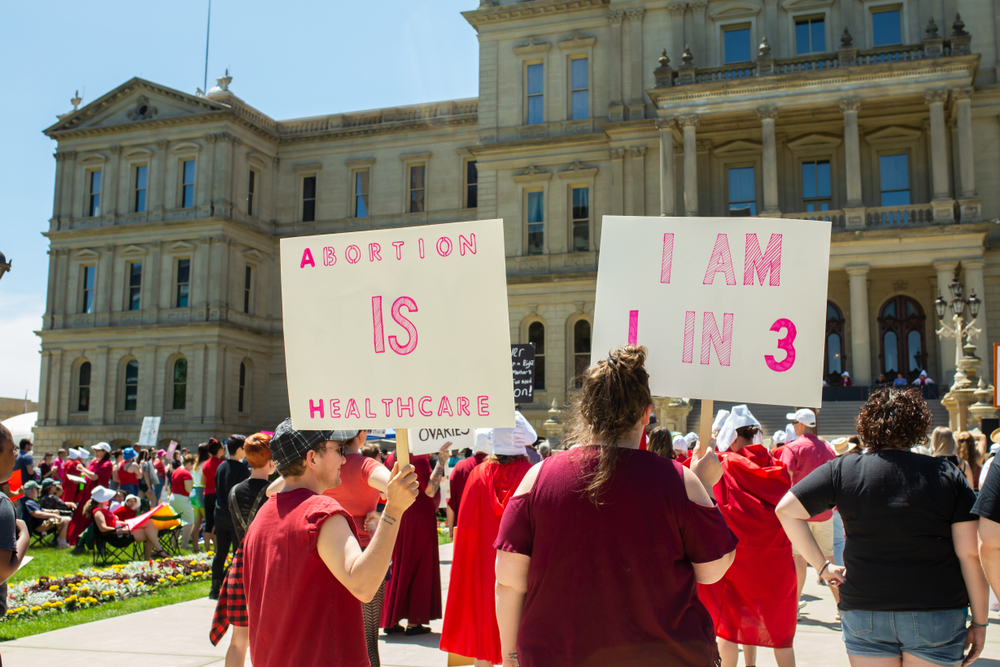
Abortion rights activists protest in front of the Michigan State Capitol. CREDIT: Shutterstock/Rachel Goodhew

This June, the Supreme Court overturned Roe v. Wade in Dobbs v. Jackson Women’s Health Organization, dismantling 50 years of precedent protecting the federal constitutional right to abortion and revoking a fundamental right for the first time in history. The Dobbs decision allows states or the federal government (or both) to severely restrict or ban abortion and does not address exceptions for medical emergencies, rape, or incest.
Now, just four months later, near-complete bans on abortion care are in effect in 11 states (as of the publication of this post), with other states seeking to enforce bans, jeopardizing the reproductive health and autonomy of millions. Additional states will further restrict legal access within the next year. Clinics in states where abortion remains legal are scrambling to accommodate large numbers of out-of-state patients, causing increased wait times, costs, and health risks for patients.
The public accounts — emerging daily — of people’s preventable health emergencies and related traumatic experiences living under abortion bans are heartbreaking. The on-the-ground disorder caused by Dobbs disproportionately falls on people living with low incomes and inadequate resources, including people of color (especially Black people). Due to structural racism, they currently face the greatest health risks during pregnancy and childbirth and often experience difficulty accessing quality care, as well as discrimination, ill-treatment, and coercion in maternal health care settings.
In the face of this public health crisis and affront to personal autonomy, state courts have the power to secure the critical right to determine for oneself whether to continue a pregnancy. Many state constitutions already offer stronger and expanded legal grounds for protecting abortion rights — and can also shield access to abortion in highly restrictive parts of the country.
State courts have heard challenges to abortion bans in nearly 20 states since the Supreme Court revoked the federal right to abortion. These lawsuits claim that state constitutions protect the right to abortion under provisions including equal protection, privacy, bodily autonomy, and liberty. The cases’ outcomes will determine the scope of legal access in large parts of the country and present an opportunity for courts to secure and strengthen important individual rights beyond abortion.
Intermediate victories in the ongoing proceedings preview just how critical state court constitutional decisions are to protecting access post-Dobbs:
- In September, the Michigan Court of Claims blocked enforcement of the state’s abortion ban (passed before Roe), holding that the law violates the rights to bodily integrity and equal protection under Michigan’s constitution. The Court found that Michigan’s constitution protects those rights more broadly than the federal constitution given the historical developments between their respective ratifications.
- In Indiana, a state trial court temporarily blocked the first state abortion ban passed after Roe fell, explaining that “Indiana’s state constitution has broader bodily autonomy and self-determination rights under a right to liberty than those found in the U.S. Constitution.” The Indiana Supreme Court has scheduled argument in the case for January 2023.
- In Ohio, a trial court found that — in addition to providing greater protection than its federal counterpart — the state constitution’s equal protection provision encompasses the right to abortion. Specifically, it held that Ohio’s ban on abortions after six weeks (before most people even know they’re pregnant) “clearly discriminates against pregnant women and places an enormous burden on them to secure safe and effective health care such that it violates” Ohio’s constitution. The state has appealed the decision.
Courts in states around the country are also considering whether abortion bans violate patients’ constitutional or statutory religious liberties, rights to health, and rights to be free from government intrusion into private affairs, including in Georgia, Florida, South Carolina, Utah, and Wyoming — each with unique constitutional traditions and court systems. The public has also weighed in on state constitutional protections for reproductive rights through democratic participation. Last week, voters in California, Michigan, and Vermont approved ballot initiatives to secure abortion rights in their state constitutions; in Kentucky, voters rejected an anti-abortion constitutional amendment.
Abortion restrictions underpin our country’s devastating history of reproductive and sexual control policies. For 50 years, the federal constitution provided a backstop against extreme political attacks on pregnant people that denied the value of their autonomy and, sometimes, their lives. Far from settling anything, the Supreme Court’s Dobbs decision released a wave of medical, social, and legal chaos upon the country.
Now, state courts matter more than ever in recognizing that bodily integrity, privacy, equal protection, and other core individual rights must include the right to end or continue a pregnancy. We all need to keep our focus on whether they get it right — and what’s at stake if they don’t.
To learn more about your own state’s courts, check out Alliance for Justice’s State Court Justice Project.
Alex Wilson is a staff attorney at the Center for Reproductive Rights, where he strategizes to expand reproductive rights protections and advance long-term constitutional change.
